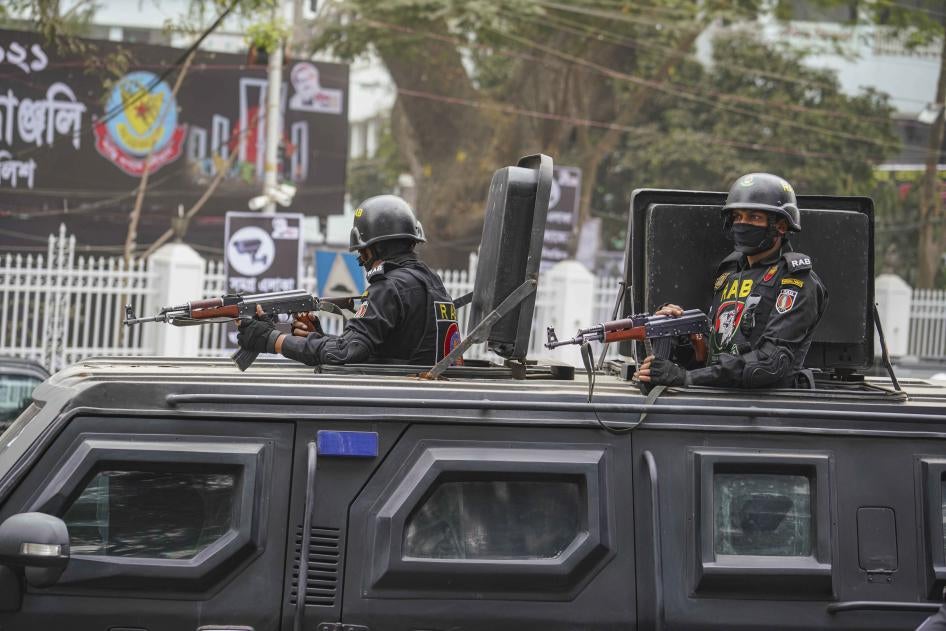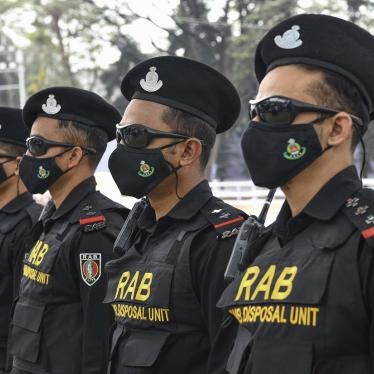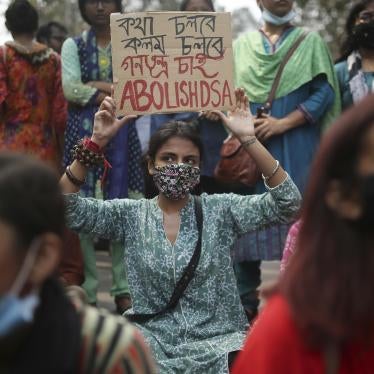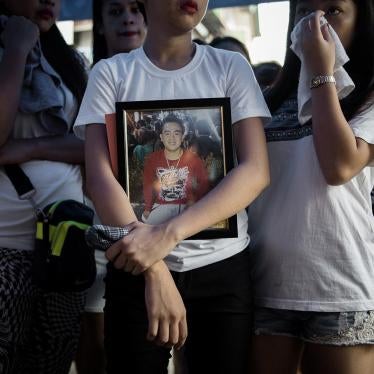(New York) – The Bangladesh government should meaningfully respond to United Nations concerns regarding grave allegations of torture, enforced disappearance, and extrajudicial killings in the country, Human Rights Watch said today. The United States has already sanctioned the country’s Rapid Action Battalion (RAB) under the Global Magnitsky Human Rights Accountability Act for serious rights violations and should be excluded from UN peacekeeping deployment.
On March 14, 2022, UN human rights experts called on the Bangladesh government to “immediately cease reprisals against human rights defenders and relatives of forcibly disappeared persons for their activism and co-operation with international human rights bodies and UN mechanisms.”
On March 3, 2022, the UN urged the Bangladesh government to follow through on its commitment to respond to allegations of torture reported during a 2019 review of its obligations under the Convention against Torture, which it has ignored for over two years. That same day, during a meeting with UN Secretary-General António Guterres, Foreign minister AK Abdul Momen reportedly asked him to appoint Bangladeshi nationals to more high-level positions in UN peacekeeping operations, including at the level of the special representative of the secretary-general.
“The Bangladesh government is seeking greater influence at the UN while simultaneously ignoring the UN’s inquiries into human rights violations by Bangladesh security forces,” said Brad Adams, Asia director at Human Rights Watch. “Bangladesh authorities are only jeopardizing the country’s standing in UN peacekeeping operations by ignoring allegations of abuse and failing to clean up their act.”
In July 2019, following its review of Bangladesh’s record, the UN Committee against Torture noted that “in general, one got the impression that the police, as well as other law enforcement agencies, were able to operate with impunity and zero accountability.”
The rights body recommended that the Bangladesh government “establish an independent vetting procedure, with appropriate UN guidance, for all military and police personnel proposed for deployment in UN peace missions and ensure that no person or unit implicated in the commission of torture, extrajudicial killing, disappearances or other serious human rights violations is selected for service.” The committee also said that it is “concerned at reports that personnel that have served with the Rapid Action Battalion have frequently been deployed for service with United Nations peace missions.”
However, the government has not demonstrated any efforts to improve vetting, and instead is seeking more senior UN peacekeeping positions for its police and military personnel.
On November 8, 2021, 12 human rights organizations raised concerns with UN Department of Peace Operations Under-Secretary-General Jean-Pierre Lacroix that the letter and spirit of the 2012 United Nations Policy on Human Rights Screening of United Nations Personnel is not being sufficiently applied in relation to Bangladeshi nationals and that the vetting procedure should be made consistent, transparent, and independent. In a statement issued on December 6, the UN Working Group on Enforced or Involuntary Disappearances expressed concern that “members of the RAB would be eligible to participate in UN peacekeeping operations, without any previous investigation into their alleged involvement in the commission of human rights abuses or a thorough vetting process.”
Bangladesh officials accused of abuses have previously held influential UN posts. For instance, Bangladesh’s police chief, Benazir Ahmed, was recently sanctioned by the United States government for involvement in grave human rights abuses committed while he was director general of RAB from 2015 to 2019, during which there were 136 reported extrajudicial executions and 10 enforced disappearances allegedly by officers under his command. During that time, Ahmed also served as an expert member of an independent review team for the UN Police Division.
The Bangladesh government has a habit of ignoring the UN’s concerns over its human rights record. The government has not responded to repeated requests by the UN Working Group on Enforced or Involuntary Disappearances to visit Bangladesh, first sent on March 12, 2013, and most recently re-issued on April 23, 2020. In the December statement, the experts noted that the lack of responses from the government, including on the request to visit the country “is all the more troubling, bearing in mind that the all allegations received refer to the frequent and ongoing use of enforced disappearance as a tool by law enforcement agencies, security and intelligence forces, especially to target political opponents or other dissidents.”
According to Bangladeshi human rights groups, nearly 600 people have been forcibly disappeared by security forces since Prime Minister Sheikh Hasina took office in 2009. While some victims have been released or produced in court after weeks or months of secret detention, others became victims of extrajudicial killings that are falsely claimed to be deaths during gunfights. Human Rights Watch has documented 86 of these cases in which victims remain missing. The Bangladesh government has repeatedly denied that security forces routinely commit enforced disappearances.
“By appointing officers credibly accused of human rights violations to UN peacekeeping operations, the Bangladesh government is risking the credibility of these important missions,” Adams said. “Bangladesh contributes more troops to UN peacekeeping than any country in the world, but the UN’s reliance on Bangladeshi troops should not mean relaxed human rights vetting procedures.”









